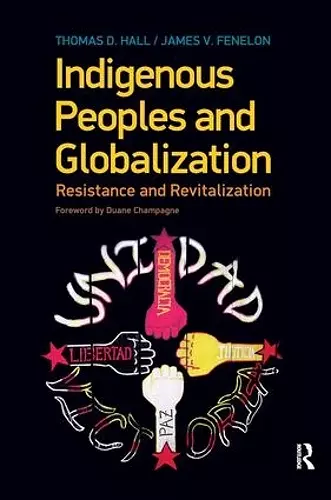Indigenous Peoples and Globalization
Resistance and Revitalization
Thomas D Hall author James V Fenelon author
Format:Hardback
Publisher:Taylor & Francis Inc
Published:30th May '09
Currently unavailable, and unfortunately no date known when it will be back
This hardback is available in another edition too:
- Paperback£49.99(9781594516580)

The issues native peoples face intensify with globalization. Through case studies from around the world, Hall and Fenelon demonstrate how indigenous peoples? movements can only be understood by linking highly localized processes with larger global and historical forces. The authors show that indigenous peoples have been resisting and adapting to encounters with states for millennia. Unlike other antiglobalization activists, indigenous peoples primarily seek autonomy and the right to determine their own processes of adaptation and change, especially in relationship to their origin lands and community. The authors link their analyses to current understandings of the evolution of globalization.
". . . [Hall and Fenelon] provide an interesting addition to the indigeneity literature. Recommended."
—CHOICE
“I strongly recommend the book for students, researchers, and scholars to help them understand the impact of globalization from an indigenous angle.”
—Rural Sociology
“Hall and Fenelon give us a global perspective on Indigenous social movements through detailed case studies of important struggles across the globe. We learn about Maori of New Zealand, the Adevasi in India, the Zapatista Movement in Mexico, and the Lakota and Navajo in the United States. These and other movements are placed in a larger framework that helps us understand how native peoples have been able to persist over the centuries and resist the recent pressures of globalization. An excellent text for classes that stress human rights and indigenous perspectives.”
—Louise Lamphere, Professor of Anthropology, University of New Mexico, Visting Professor at University of California–Berkley
“This book provides considerable empirical detail in case studies that are helpful and illustrative…. The book covers theoretical insights that all students in the social science and American Indian studies fields should be aware of and should take into consideration when analyzing policy, history, and current events among indigenous peoples.”
—from the foreword by Duane Champagne
“This is a book I’ve long been hoping for, as an introduction to Native American Studies. Combining social scientific analysis with humanistic commitment, Hall and Fenelon examine the persistence of Native peoples throughout the Americas and beyond amidst the encroachments of globalism. A superb work.”
—Christopher Vecsey, Director of the Native American Studies Program, Colgate University
“This fascinating study examines the continuing struggles of indigenous peoples to sustain their autonomy in the face of both national and international political and economic forces. Using a revitalized notion of ‘world systems’ professors Hall and Fenelon illustrate the importance of appreciating the global dimensions to the long history of such widespread resistance by indigenous societies.
Using closely argued examples from both current and past contexts the authors show in detail the intricate sets of relationships that bind the fate of indigenous peoples to the vagaries of political and economic power beyond their own social horizons.
Particular case studies of the Mexican Zapatistas, the Maori in New Zealand, Adevasi in India, and of Native North America convincingly ground the authors’ theoretical approaches and allow them to make a powerful historical argument for indigenous human rights.
Hall and Fenelon stress that a better understanding of the cyclical nature of such conflicts is itself an important element in ensuring recognition of those rights. As a result we are obliged to rethink not just our scholarly analyses but also the nature of our own political and cultural commitments to a more equitable world.
Indigenous peoples throughout the world are experiencing the full presence of injustice in the form of duplicitous development schemes, poverty, landlessness, dispossession, political and religious oppression, and genocide. Hall and Fenelon have created a remarkable book about the complex reasons for these injustices. They extend their earlier work in a sober, yet provocative manner, especially from a world-system perspective. The power of the book rests on its ability to provoke and urge us to rethink many facets of social change and history connected to the diverse indigenous peoples on our planet.”
—Pat Lauderdale, Professor of Justice, Arizona State University, Visiting Scholar, Stanford University, Center for the Comparative Study of Race and Ethnicity, and the Department of Sociology
ISBN: 9781594516573
Dimensions: unknown
Weight: 430g
208 pages